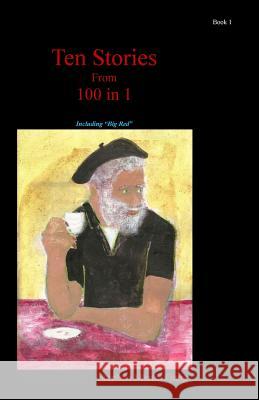Ten Stories From 100 in 1: Between the Rooms » książka
Ten Stories From 100 in 1: Between the Rooms
ISBN-13: 9781508468493 / Angielski / Miękka / 2015 / 164 str.
Ten Stories From 100 in 1 is my first book. The stories look at life and relationships. Examples include a relationship which can be like a soda machine that refuses to give you what you want or your money back. It can frustrate to the point you forget why you came. And, some people go through relationships like television channels. They constantly change channels. Zoroaster said that we could never know God, but we could fathom the characteristics of God through the intellect. Paul Ricoeur said that truth could only be found in play, and Friedrich Wilhelm Nietzsche said that truth is illusion which we chose to forget is an illusion. For me, life is the three statements. Through intellectual play we create truths that are illusions which we forget are illusions. I marvel at the universe and I am amazed by the brilliance of man. Yet that same universe can seem cruel, and the same person that seems to be genius can be a total idiot outside of a particular discipline. Lovis Corinth had a stroke and his work became distorted from brain damage. The distorted work was seen as genius. Was he genius or did society create the genius? Facts are based on some level of belief. In grammar school I came across the paradox of the arrow. Mathematically the arrow can never hit the target. Even the logical and concrete are flawed. Two things are important to me, relationships and creativity. Relationships being the most important and gives meaning to my life. The second being creativity, which is what keeps me semi-sane. I think I know myself, but do I? How many times have I asked myself why I did or said something? I have done many things incongruent with how I see myself. What I see in the mirror is a two dimensional reflection filtered by expectations. The more concise our understanding, the greater the entropy. All these thoughts are what define me and the stories. I have always had to create. Whether or not it is good is for someone else to decide. and, as many people know, the observer changes behavior and outcome. Writing always comes from experience. This experience could be direct or indirect, and writing requires some source of worldly influence if it is to have any coherence, including what has been lived in books which the author has read. We each live a story differently. Sex, politics and religion are contested topics. I learned in the art world it almost didn't matter what was presented. Opinions would vary and carry a range of emotions and thoughts. When writing I frequently try to write from the perspective of an opposing character. To prove a point I once displayed, under an alias, an empty and broken Styrofoam cup as part of a group exhibition (think Marcel Duchamp, "Fountain" 1917). The comments "ranged from "this is a high school mentality, terrible, and must be a joke" to, this was "the only well thought out and worthwhile piece of art in the exhibition," because it was a statement about the environment and waste of man. What it was . . ., was a Styrofoam cup nailed to the wall. I tried many styles, but in the end, I can only write from the head and heart. I have to forget the current Zeitgeist, and just write what I think and feel. Yet, as Georg Hegel said, "No man can surpass his own time, for the spirit of his time is also his own spirit." Writing is a form of play, and unlike the young child of Piaget, rules can be and are broken. I set out to write each day with the goal of finishing one hundred stories in a year. I guess the term story is a misnomer. Perhaps, they would be better called moments, thoughts, or pieces. It is a stream of consciousness in writing. It is an attempt to communicate and understand who I am, and who I am not. "I" is not a static word. I wanted to share ten of the first forty thoughts. I hope they have something for you. If not . . . it couldn't be helped.
Zawartość książki może nie spełniać oczekiwań – reklamacje nie obejmują treści, która mogła nie być redakcyjnie ani merytorycznie opracowana.











